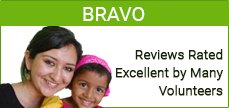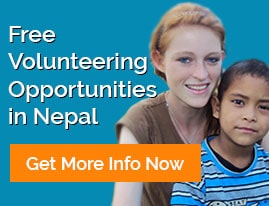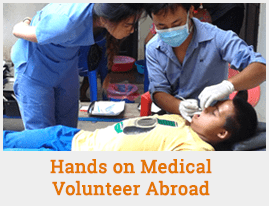VOLUNTEER IN CAMBODIA
' I LOVE this experience in chitwan for though short period! '
Xue Ying Fiona WangCambodia's FAQs
Disclaimer:The information given in this FAQ's page is generic. You should verify critical information such as visa-related issues, health and safety, customs and transportation with the relevant authorities prior to traveling. Please be aware that information given in FAQ's may change at any time. In effect, we accept no responsibility for any loss, injury or inconvenience sustained by anyone resulting from this information. For the latest updates, please contact us or our in-country coordinator(s).
General Information
The founder of RCDP has been involved in volunteer abroad business for the last 10 years. During this time, he has worked with more than 2000 volunteers and more than 200 universities, colleges, and schools groups.
Working with inspiring college students and humanitarian volunteers was very motivating as well as very enjoyable and presented many exciting learning opportunities. This experience encouraged him to start his own volunteer abroad program where affordable prices, premium programs and meaningful contributions to deprived communities would become the key components of the programs.
With this in mind, while setting up volunteer and travel abroad organization, we have selected many safe and culturally rich destinations where volunteers can make meaningful contributions, immerse in local culture, and get enriched from volunteer abroad experience. In each destination, we have carefully selected projects, host families, travel coordinating staff, and placed local support staff. We have provided them with extensive training to manage the program with professional services that will be delivered with care and respect for all volunteers. We are now proud of our coordinators, host families, host projects, and staff as all of them have at least 4 years of working experience with international volunteers. To meet your expectation, they are committed to working hard, delivering professional services, and turning your volunteer abroad experience into a memorable journey.
In Cambodia, we operate volunteer programs in Phnom Penh, Battambarg, Siem Reap, and Pursat. We look after our volunteers during their entire stay in Cambodia.
Information on Application
Starting application
There are two options available to those applying for volunteer positions in the Sri Lanka programs:
Apply online : Download application form from our website. Fill it out, and mail it to RCDP International.
After submitting application
Once RCDP receives your application, it will immediately be forwarded to Cambodia for processing. Our Cambodia, our in-Country coordinator will carefully review your application to ensure you get placed in the project that matches your criteria and qualifications.
Duration of the application process
Once our Cambodia in-Country coordinator finalizes and forwards us the detail, we will immediately get in touch with you. The whole process normally takes 1-2 weeks. However, this sometimes takes longer.
You will also find an invoice requesting to pay the program fee along with the placement details.
Preparation
Once you receive the placement details, you can call our Cambodia office directly and speak to our in-Country coordinator and ask any questions you might have that will help prepare you for the trip.
Preparation for Cambodia trip includes: reading about Cambodia, vaccination, visa arrangement, booking tickets. Should you come across ANY problems, please call our RCDP office.
Once you purchase air tickets, you should immediately submit your flight details to both RCDP and Cambodia office.
Airport and Arrival Information
Phnom Penh International Airport is your arrival point for your volunteer travel to Cambodia, so please book your flight accordingly. Even if participants are joining a program elsewhere in the country, RCDP International suggests participants arrive in Phnom Penh. One of RCDP's representatives will await your arrival at the airport. Participants should ensure pick-up by sending their flight information to RCDP's offices - a follow-up call is suggested as your departure date draws closer.
Flight Delayed or Missed
If volunteers are delayed or miss flight, it is highly recommended that you call our offices or your coordinator and make alternative arrangements with them. In the event that a volunteer gets lost, our general suggestion would be to go to a hotel via taxi. Once you meet our representative or coordinator, you will be transferred to our offices and onto your accommodations where you will meet staff members and fellow volunteers.
Arrival Day
The program fee covers expenses beginning of the first day of the to the last day of the program. If you arrive before the first day of the program and/or stay beyond the last day of the program, expenses are your responsibility (usually $30 per day for room/food in guesthouse or host family).
Note: The Cambodia in-country staff encourages you to arrive on Friday before your project begins as there is much to explore and experience. The Cambodia in-country staff hosts a welcome dinner on Thursdays and on Mondays (the starting day for projects) where you will have a general Orientation.
Information on Visa
RCDP International requires volunteers to acquire a tourist Visa in their home country prior to departure for Cambodia. Volunteers should apply for a tourist visa. Please find the Cambodia Embassy Abroad below:
http://www.embassyworld.com/dev/result.php?guest=36&host=%25&count=0&menu=1
United States of America
Embassy of Cambodia,
4530 16th Street, NW
Washington, DC 20011
p. 202.726.7742 202.726.7742
f. 202.726.8381
E-mail: mail@embassyofcambodia.org
Canada (Contact US Embassy for information)
United Kingdom
Royal Embassy of Cambodia
64 Brondesbury Park,
Willesden Green, London NW6 7AT,
United Kingdom
Tel: (0208) 451 7850
Fax: (0207) 483 9061
E-mail:cambodianembassy@btconnect.com
Web: www.cambodianembassy.org.uk
Australia
Royal Embassy of Cambodia
No. 5 Canterbury Crescent,
Deakin, A.C.T. 2600, AUSTRALIA
Tel: (612) 6273 1259, 6273 1154
Fax: (612) 6273 1053
Email: Cambodianembassy@ozemail.com.au
Information on Health and Safety
Volunteers should be aware of all health and safety information before traveling to Cambodia. We suggest you visit some of the websites listed below.
- WHO website for international travelers (http://www.who.int/csr/ihr/en)
- WHO Cambodia (http://www.who.int/csr/ihr/en)
- Centers for Disease Control & Prevention
1600 Clifton Road , NE
Atlanta , GA 31333
(888) 232-3228
(888) 232-3299 - fax information service - Health Canada Online
- Canadian Department of Foreign Affairs and International Trade and Travel Report
- U.S. State Department & Consular Information Sheets
Room 4811
2201 C Street NW
Washington , DC 20520
(202) 647-5225 - Travel Health Online
- Travelers' Health
General Health Tips
- Drink only bottled or boiled water or carbonated (bubbly or fizzy) drinks in sealed cans or bottles. Avoid tap water, fountain drinks and ice cubes. If safe drinks are not available, you can make tap or other water safer by both filtering through an "absolute 1 micron or less" filter AND adding iodine tablets to the filtered water. "Absolute 1 micron filters" can be found in camping/outdoor supply stores.
- Buy bottled water from respectable outlets to guard against upset stomach. Make sure that the seal of the bottle is intact.
- Watch out for spicy dishes, especially at the beginning of your trip. Avoid eating food from road-side stalls. Eat unpeeled fruits and avoid fresh salads, especially in small hotels. If you are forced to eat food at some place that you have doubts about, make sure the food is cooked and served hot.
- Always use an insect repellent if you find yourself in a mosquito laden area. Keep in mind that not every place is always mosquito-infested.
- If traveling in scorching heat, remember to drink enough water, wear hats, sunglasses & SPF/sunscreen. Stay out of the intense mid-day sun.
- Pharmacies or chemists are available in every little town and village at which you can buy over-the-counter medications and receive minor medical advice. In case you need to see a doctor for a specific condition, ask for help from your in-country coordinator or project director. The cost of visiting a doctor is low (less than a dollar) compared to western countries.
- In Cambodia, most modern medicines are available over the counters in drugstores, but it is wise to travel with a reserve stock. If you take any prescription drugs, bring enough for the duration of the trip. It is advisable that you carry a small health kit, which should include upset stomach/digestive tract remedies, antiseptic cream, mosquito repellant spray, sunscreen, etc.
Information on Vaccinations
We strongly recommended volunteers to get vaccination before travel. Recommended Vaccinations and Preventive Medications by CDC
(http://wwwn.cdc.gov/travel/destinationCambodia.aspx)
The following vaccines may be recommended for your travel to Southeast Asia including Cambodia. Discuss your travel plans and personal health with a health-care provider to determine which vaccines you will need.
Vaccines Recommended:
The following vaccines may be recommended for your travel to South Asia. Discuss your travel plans and personal health with a health-care provider to determine which vaccines you will need.
- Hepatitis A or immune globulin (IG). Transmission of hepatitis A virus can occur through direct person-to-person contact; through exposure to contaminated water, ice, or shellfish harvested in contaminated water; or from fruits, vegetables, or other foods that are eaten uncooked and that were contaminated during harvesting or subsequent handling.
- Hepatitis B , especially if you might be exposed to blood or body fluids (for example, health-care workers), have sexual contact with the local population, or be exposed through medical treatment. Hepatitis B vaccine is now recommended for all infants and for children ages 11-12 years who did not receive the series as infants.
- Japanese encephalitis, if you plan to visit rural farming areas and under special circumstances, such as a known outbreak of Japanese encephalitis.
- Malaria: your risk of malaria may be high in these countries, including cities. See your health care provider for a prescription anti-malarial drug. For details concerning risk and preventive medications, see Malaria Information for Travelers to South Asia.
- Rabies , if you experience extensive unprotected outdoor exposure in rural areas, such as might occur during camping, hiking, or bicycling, or engaging in certain occupational activities.
- Typhoid, Typhoid fever can be contracted through contaminated drinking water or food or by eating food or drinking beverages that have been handled by a person who is infected. Large outbreaks are most often related to fecal contamination of water supplies or food sold by street vendors Vaccination is particularly important because of the presence of Salmonella-typhi strains resistant to multiple antibiotics in this region. There have been recent reports of typhoid drug resistance in India and Nepal.
- As needed, booster doses for tetanus-diphtheria and measles measles/mumps/rubella (MMR), diphtheria/pertussis/tetanus (DPT) and a one-time dose of polio for adults.
Information on Monetary Issues
Currency
The local currency is the Cambodia Riels.".
Exchanging
Find the Exchange Rate of Cambodia: http://www.xe.com/ucc/convert.cgi
ATM/Debit Card/Debit Card/Travelers Checks
In Cambodia, credit card information is often stolen and used fraudulently just by paying with a credit card. For this reason, RCDP International Volunteers suggests cash and travelers checks to settle your bills. Travelers should have a credit card for large and emergency purchases You can also carry a debit/ATM card that can be used at ATM's to withdraw local currency. An ATM card is the best way of getting money. Vendors are available in major banks and department stores in Bangkok. Visa, MasterCard and American Express are accepted in some of the large stores and hotels in larger cities but not accepted in smaller cities.
You will have trouble actually paying with traveler's checks, but you will be able to exchange them at local banks. Traveler's Checks are recommended as a safe way to carry money with you, make sure you write down the check numbers and contact information you need to cancel stolen checks. Different brands of traveler's checks work better in different countries so consult your local financial institution regarding which Traveler's Checks to bring to Cambodia.
Budget
How much money you bring depends on your personal spending habits. Thrifty people can get by on less than $10/day. Your budget should also include money to explore Cambodia in free time as well as for your personal use. A good rule of thumb for money management is the 1/3 method, bring 1/3 cash, 1/3 traveler's check and leave 1/3 of your money in your account - plus a credit card for emergencies.
Information on Field Support and Supervision
Once your volunteer program begins, our local staff members stay in constant touch with you. However, if you are staying far from the Phnom Penh office, our staff will visit volunteers every 2-4 weeks (if possible) and you are always welcome at the office. We recommend that the volunteers stop by the office once a week, if they are staying/working in the local area, to give feedback on their home stay and project. Many minor issues can be avoided with a just little extra communication before they develop into major issues. Your project will have local staff members in addition to our in-country coordination staff. If your project is located a long distance from our offices, then our local staff communicates by either email and/or phone.
We are available for you at the local office via email and phone for your entire trip. It is our job to make sure that you are safe and healthy.
Volunteers are requested to bring their UNLOCKED mobile phones. Upon arrival in Cambodia, participants can purchase and change SIM cards and use it. This is the perfect way to stay in touch with your family and RCDP International Volunteer's offices in Phnom Penh.
Information on Climate
The internet offers current weather forecasts for your destination:
Yahoo Weather: http://weather.yahoo.com/regional/CBXX.html (www.weather.yahoo.com)
The Weather Channel: www.weather.com
The Weather Underground: http://www.wunderground.com/cgi-bin/findweather/getForecast?query=cambodia
Situated in the tropical zone, Cambodia is bathed in sun almost all year around. There are two main seasons: the rainy season and dry. Each season brings about a refreshing change. The humid, rainy season lasts from April to October. Temperatures range from 27-35 degrees Celsius. The hottest month is April when the temperature can reach 41 degree C these days. The cool, dry season lasts from November to March, with temperatures ranging from 17-27 degrees C. December to January is the coolest period at about 27 degrees C.
| Average Monthly Rainfall | Average Monthly Temperature | ||
| . | in | . | °F |
| Jan | 0.30 | Jan | 88 |
| Feb | 0.40 | Feb | 91 |
| Mar | 1.40 | Mar | 93 |
| Apr | 3.10 | Apr | 95 |
| May | 5.70 | May | 93 |
| Jun | 5.80 | Jun | 91 |
| Jul | 6.00 | Jul | 90 |
| Aug | 6.10 | Aug | 90 |
| Sep | 8.90 | Sep | 88 |
| Oct | 9.90 | Oct | 87 |
| Nov | 5.50 | Nov | 86 |
| Dec | 1.70 | Dec | 86 |
Materials to Bring
- Camera
- Mobile phone (you can use mobile phone after changing sim card)
- Sleeping bag
- Mosquito repellents
- Insect repellents
- Sun-block
- Working gloves (if you are joining conservation or construction project)
- Some books about Cambodia
- Map of Cambodia
- Toiletries
- First aid kit
- Flash light
- Electricity adopter/converter
- Sun glasses
- Footwear (for work and travel)
- Towel
Information on Bringing Gifts for Project
It is a common courtesy to bring a small gift for the family that will be hosting you. You are not required to do so, but if you choose to bring something it can be pretty simple. We suggest a box of chocolates, a t-shirt with a hometown logo, or pictures of your family and some local post cards. If you want to bring gifts for your project (and if you are working for an orphanage or a school please bring pencils, pens and paper, art supplies like markers and construction paper pads, and games. Remember that every child will need these items so you may wish to bring a bunch of one thing.
 1-2543048951
1-2543048951


